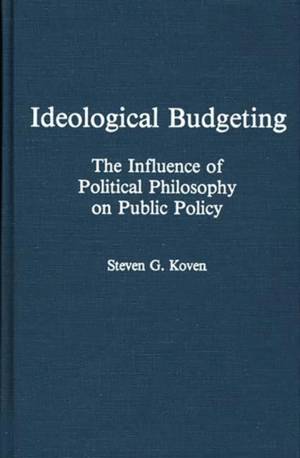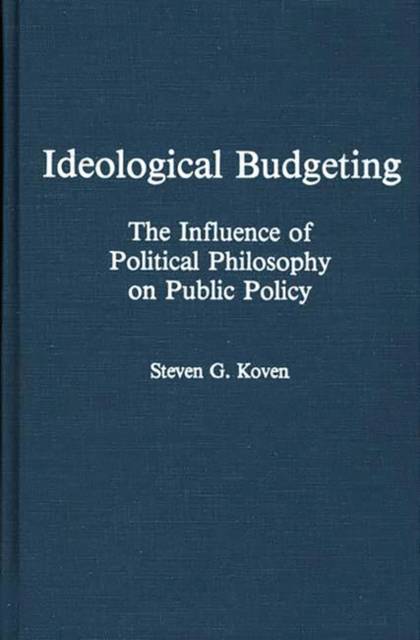
Bedankt voor het vertrouwen het afgelopen jaar! Om jou te bedanken bieden we GRATIS verzending (in België) aan op alles gedurende de hele maand januari.
- Afhalen na 1 uur in een winkel met voorraad
- In januari gratis thuislevering in België
- Ruim aanbod met 7 miljoen producten
Bedankt voor het vertrouwen het afgelopen jaar! Om jou te bedanken bieden we GRATIS verzending (in België) aan op alles gedurende de hele maand januari.
- Afhalen na 1 uur in een winkel met voorraad
- In januari gratis thuislevering in België
- Ruim aanbod met 7 miljoen producten
Zoeken
Ideological Budgeting
The Influence of Political Philosophy on Public Policy
Steven G Koven
Hardcover | Engels
€ 110,45
+ 220 punten
Omschrijving
Koven examines how political philosophy shapes public policy. In particular, he emphasizes the influence of ideology on one policy area--budgeting in the public sector. That political beliefs greatly affect the type of policy implemented appears obvious, as would the benefit of rational--not ideological--policymaking. Yet, the question of whether policy is developed by politically biased appointees or by neutral administrators is not so easily answered. Koven asserts that government policy determined by philosophical factors directly contradicts the view that public policy should be developed by policy experts via rational analysis. He concludes that through the recognition and control of confounding influences, objective policy can--and should--be formulated.
Specificaties
Betrokkenen
- Auteur(s):
- Uitgeverij:
Inhoud
- Aantal bladzijden:
- 204
- Taal:
- Engels
Eigenschappen
- Productcode (EAN):
- 9780275929466
- Verschijningsdatum:
- 24/08/1988
- Uitvoering:
- Hardcover
- Formaat:
- Genaaid
- Afmetingen:
- 138 mm x 216 mm
- Gewicht:
- 403 g

Alleen bij Standaard Boekhandel
+ 220 punten op je klantenkaart van Standaard Boekhandel
Beoordelingen
We publiceren alleen reviews die voldoen aan de voorwaarden voor reviews. Bekijk onze voorwaarden voor reviews.









